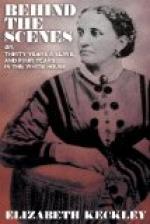I had not been at Pontotoc very long when I saw the hounds run a slave, by name Ben Lyon. “Old Ben,” as he was called, ran away and had been gone a week when he was seen by a woman who “told on him,” and then I was sent to get the man who had trained dogs, or hounds as they were called. The dogs ran the slave about ten miles when they lost track at a creek, but he was caught that night in a farmer’s house getting something to eat.
* * * * *
Instructions in medicine.
After some time, Boss began to tell me the names of medicines and their properties. I liked this and seemed to grasp the idea very well. After giving me a number of names he would make me repeat them. Then he would tell me the properties of each medicine named, how it was used and for what purpose and how much constituted a dose. He would drill me in all this until I knew it and, in a short time, he would add other names to the list. He always showed me each medicine named and had me smell and carefully examine it that I might know it when seen again. I liked this, and used to wish that I was as wise as my master. He was very precise, steady and gentle in any case of sickness, and, although he had long retired from the medical world, all recognized his merit wherever he went. I used to go to the woods and gather slippery elm, alum root and the roots of wild cherry and poplar, for we used all these in compounding medicines for the servants.
* * * * *
The overseer—whippings and other cruelties.
The overseer was a man hired to look after the farm and whip the slaves. Very often they were not only cruel, but barbarous. Every farmer or planter considered an overseer a necessity. As a rule, there was also on each plantation, a foreman—one of the brighter slaves, who was held responsible for the slaves under him, and whipped if they did not come up to the required task. There was, too, a forewoman, who, in like manner, had charge of the female slaves, and also the boys and girls from twelve to sixteen years of age, and all the old people that were feeble. This was called the trash gang. Ah! it would make one’s heart ache to see those children and how they were worked. Cold, frosty mornings, the little ones would be crying from cold; but they had to keep on. Aunt Polly, our forewoman, was afraid to allow them to run to get warm, for fear the overseer would see them. Then she would be whipped, and he would make her whip all of the gang. At length, I became used to severe treatment of the slaves; but, every little while something would happen to make me wish I were dead. Everything was in a bustle—always there was slashing and whipping. I remember when Boss made a change in our overseer. It was the beginning of the year. Riley, one of the slaves, who was a principal plower, was not on hand for work




